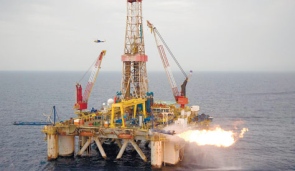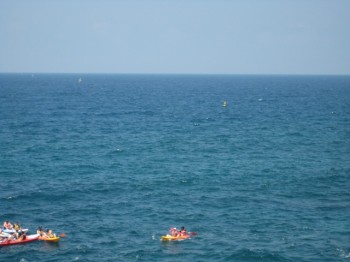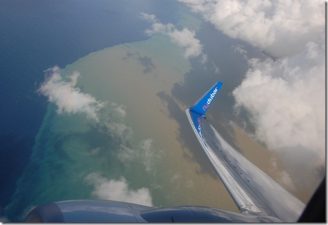 Israel’s newly declared northern maritime boundary: note the slanted line that skirts the northern edge of the northernmost gas fields
Israel’s newly declared northern maritime boundary: note the slanted line that skirts the northern edge of the northernmost gas fields
As a result of a series of Egyptian natural gas pipeline sabotages by terrorists in the Sinai, the third blast occurring just a few days ago, Israel is putting more efforts into developing the undersea natural gas fields it has found in a number of locations off its western coastline. These energy explorations in the eastern Mediterranean have resulted in disputes with neighboring Lebanon over natural gas fields being developed there. These disputes have resulted in the UN declaring it will mediate in the gas fields dispute between the two countries.
 Natural gas well, eastern Mediterranean
Natural gas well, eastern Mediterranean
These border disputes appear to be coming to a head after Lebanon submitted maps to the UN in an effort to substantiate its claim to some of the gas fields that Israel is now developing. These unilateral efforts on Lebanon’s behalf have resulted Israel conducting some unilateral action of its own by approving on Sunday, July 10, the demarcation of its northern maritime border with Lebanon. This action, reported in the Jerusalem Post, was approved by the Israeli Cabinet and “demarcates economic rights in offshore territories that – with the discovery of vast natural gas reserves – have become very economically lucrative”.
 Border markings as seen at Rosh Hanikrah: note the yellow buoys.
Border markings as seen at Rosh Hanikrah: note the yellow buoys.
This action on Israel’s part is meant to counter Lebanon’s UN moves, as well as provide a formal declaration on Israel’s part of the area within which it considers its maritime boundaries to be.
In a statement issued by Israel’s Deputy Foreign Minister Danny Ayalon to the media:
“The dispute over the border with Lebanon was created by the Lebanese. It is incorrect that the Americans sided with Lebanon in this dispute. There are very objective and organized rules, and I think that Israel will have no problem proving its ownership of the maritime areas that are ostensibly in dispute.”
The remarks concerning that American has sided with Lebanon in this dispute came after Israel’s Foreign Minister Avigdor Lieberman told the Israeli media that reports stating that the US has backed Lebanon in this dispute are “utter nonsense”.
Israel and Lebanon are not the only interested parties in this maritime territorial dispute, as Cyprus is also planning to do some undersea energy exploration of its own, despite some misgivings concerning possible environmental damage that undersea gas wells could cause.
The boundary line drawn by Israel is a formal declaration of the previous line that has been in place for some time now and marked off by a series of yellow buoys that can easily be seen by visitors to Israel’s most northern location on its coastline, the sea grottos of Rosh Hanikrah where a wall map indicates the boundary between the two countries.
Lebanon’s declared boundary line, undercuts Israel’s by a small measurement. This measurement is enough, however, to infringe on Israel’s formally declared maritime border, as well as the northern boundary of some of these natural gas fields (see map).
For both countries, however, it’s not just a matter of economics – it’s a matter of national pride.
Map via Noble Energy
Read more in regional undersea natural gas issues:
Third Egyptian Natural Gas Pipeline Blown up by Terrorists
Cyprus Fears Environmental Impact of Undersea Gas Drilling
Sabotaged Egyptian Gas Pipeline to Israel Shifts Energy Attention Elsewhere
UN to Mediate a Natural Gas “Standoff” Between Israel and Lebanon




Israelis can’t live without killing occupying and stealing the others whether on land or sea.
This is the first time the Arabs want the Israelis not to be “In the sea” after years the wanted to throw the to the sea a and now suddenly they want to leave the sea and return to the land …